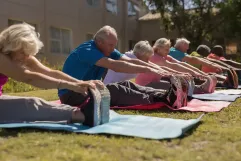
How will the new generations age?
The scientific advances derived from research and the chance to cultivate healthy habits allow people to imagine a different way of facing up to the start of their more mature years.
There were times, not so long ago, when anyone who had reached their fifties were considered to be an elderly person. Today, our society seems to be obsessed with reaching perpetual youth. But: is it really possible to face up to the years healthily, delaying the undesirable physical effects that we usually associate with old age?
In order to analyse this question, we talked to Tamara Pazos, a brilliant young scientist who studied for a Master in Neuroscience and who has written interesting books with titles such as Crecer sin envejecer (Grow without aging), Este Libro te hará vivir más (o por lo menos major) (This book will make you live longer (or at least better) and La biologia aprieta pero no ahoga (Biology pinches but it doesn’t choke) (all of them published by Paidós). In her opinion, the information we have available to us today gives the new generations the chance to age in a different way. Additionally, now we are seeing “a great research effort and investment in biomedicine, completely aimed at studying these cellular aging processes and illnesses associated with this.
Chronological age versus biological age
The first thing that we must consider is that the chronological age will unavoidably, continue to move forward, but the biological age will depend on how much we have looked after ourselves. “According to the context and the access to healthcare resources, there will be people who are seventy years old with a young, functional immune system, who are able to face up to and repair the damages derived from the passing of the years. And there will be other people who, due to an accumulation of stress, physical inactivity, environmental pollutants, lack of sleep, etc., who will have a deteriorated immune system that will speed up the aging process. The greatest differences will be found linked to the socio-economic status and the possibilities of access to these scientific advances,” Pazos explains.
A change of mentality
The science of longevity offers us a chance to change our mentality. “The idea is not to add years of life, but to add life to the years,” this researcher affirms. And she adds: “The science of longevity is showing us that aging is pliable and that we can influence how our immune system ages, which acts as the conductor for an orchestra of many other processes. A healthy immune system not only responds well to infections, it also keeps inflammation at bay which, when it becomes chronic, encourages cardiovascular, neurodegenerative or metabolic disease. Understanding this allows us to design specific strategies to help us to reach advanced ages in a better physical and mental state.



